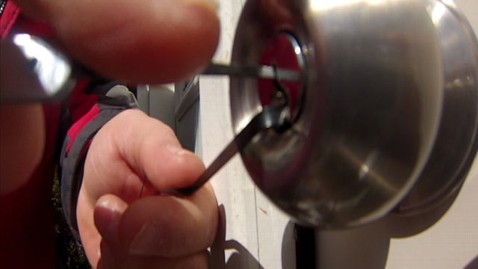What to Know When You're Locked Out of Your House
"Phone, Keys, Wallet." We all live by that check list as we are running out the door, but sometimes one of those items can fall off your radar. Locking yourself out of your house might be one of the costliest lapses out of the three, because if a family member or friend cannot deliver a spare set of keys, your next call could be a locksmith who will use your situation as a ripe business opportunity.
Experts Mike Bronzell, chairman of the Associated Locksmiths of America task force, and Ira Cheek, owner of CID Locksmith in the Queens section of New York, offer some advice on how residents can be prepared, and the best ways to get back into your home safely, without spending any more money than necessary.
Watch ABC's "The Lookout" on Wednesdays at 10 p.m. ET
1. Be prepared
Before you need one, find a local-area locksmith who you are familiar with, and save the number in your phone. This advanced planning can get you to a trusted locksmith when needed.
2. Ask for the specifics
Experts tell residents to be wary if a company answers the phone with a generic phrase like "locksmith service" and refuses to give the full name of the company. The Federal Trade Commission recommends asking for the legal name of the business and its address to verify that it is in fact local if it advertises itself as such.
3. Confirm your rate
Some locksmith companies make big promises online for services as low as $15 and up, but ABC's "The Lookout" discovered in our experiment that we were never charged just the base price. It is important to ask about any additional fees before agreeing to the service. Companies may charge additional service fees to drive to the resident's home or to respond to a call in the middle of the night.
4. Know who you are working with
When a locksmith arrives at your home, ask to see the locksmith's identification, as well as the locksmith's license number if you live in a state that requires locksmiths to be licensed. The 15 states that currently require locksmith licensing are Alabama, Connecticut, Nebraska, Nevada, Oklahoma, Oregon, Illinois, Texas, California, Louisiana, Maryland/D.C., New Jersey, North Carolina, Virginia and Tennessee. You should also expect the locksmith to ask you for your identification. Experts say that this is a locksmith's No. 1 rule. A legitimate locksmith will want to confirm that you live at that residence before doing any work.
5. Pay attention to the car
The FTC notes that while "some locksmiths work out of a car for quick or emergency jobs … most will arrive in a service vehicle that is clearly marked with their company's name."
6. Beware of the drill
Experts say that typically a locksmith's first option should be to pick a lock, not to drill it.
Got a consumer problem? The ABC News Fixer may be able to help. Click here to submit your problem online . Letters are edited for length and clarity.

(Photo Credit: ABC News) Locksmith picks house lock.